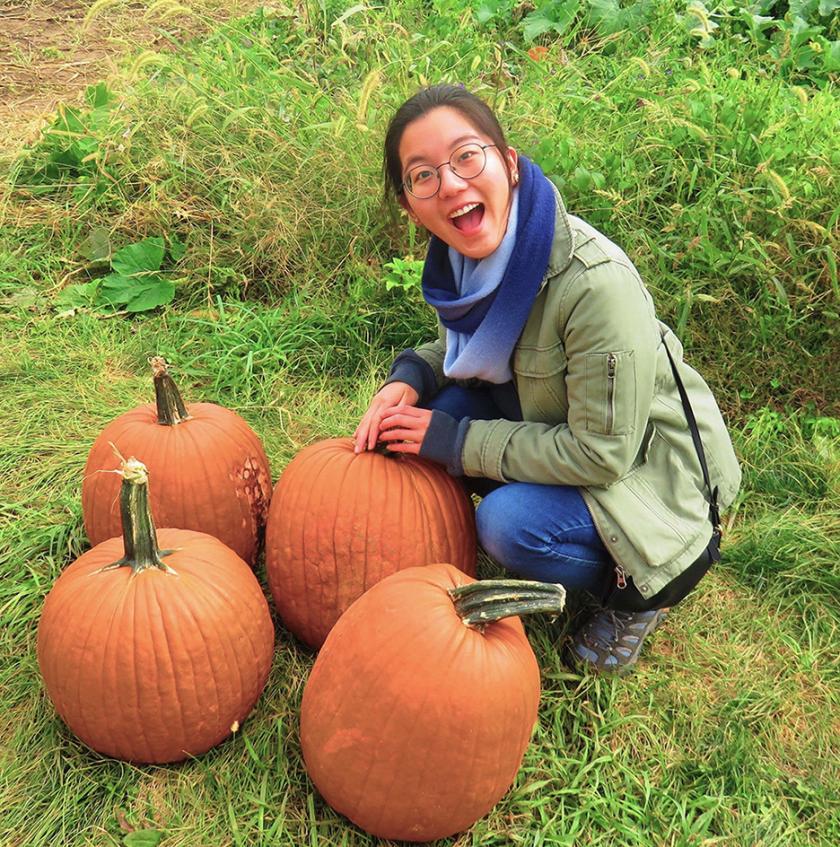
It was her interest in understanding how people seek and use information, particularly STEM-related information, that inspired Sharon Han to pursue her MS/LIS degree. At Illinois, she has gained experience as a graduate assistant in the Funk ACES Library and a research assistant for the Young Researchers project.
Why did you decide to pursue an LIS degree?
In true library fashion, my decision to pursue librarianship was serendipitous. Before pursuing my MS/LIS degree, I completed a BA in archaeology with minors in art history and earth science from Washington University in St. Louis. The summer before my junior year of college, I worked for the St. Louis Science Center as an earth science education intern. I really loved helping people make sense of academic research and think about how science relates to their lives. My interest in the intersection between academic research and public perceptions, especially as it relates to science, made me curious to learn more about how people seek out and interpret information. I didn’t think my love for understanding how people interact with science related to libraries until I spoke to my supervisor at my college job . . . in the library. Once I realized that there are actual careers in understanding how people seek and use information, I was sold on librarianship as the career path for me.
Why did you choose the iSchool at Illinois?
Unsurprisingly, a lot of LIS professionals I spoke to in St. Louis recommended the iSchool at Illinois because of its strengths in courses, research, and the University's extensive library system. I knew it was considered a strong program that could help me pursue my professional interests. However, it wasn’t until I visited the school on Admitted Students Day that I really committed to going here, for two main reasons. First, the people I met—both iSchool staff and other prospective students—were amazing. Everyone was kind and engaging, and I could immediately see myself working and hanging out with them (which we now do). Second, the financial support opportunities—i.e., graduate assistantships and hourly positions—are substantial. While such positions are not perfect solutions to offset the explicit and implicit costs of graduate education for all, I still appreciate the opportunity for iSchool students to gain financial and professional benefits through library positions during our education. I am at the iSchool because I have so much to gain from my graduate assistantship.
What particular LIS topics interest you the most?
Currently, I am interested in understanding information-seeking behaviors and applying usability engineering (user experience, etc.) as they pertain to STEM information creation, curation, and sharing in both general and academic audiences. The intersection of all these topics interests me because it demands I learn from a variety of other fields—from design to sociology to education. I've also been interested in nontraditional libraries and how libraries can reach out to historically underserved populations. These interests have led me to some neat opportunities on campus, such as volunteering at the Asian American Cultural Center and helping develop refugee service frameworks for public libraries with the Mortenson Center for International Library Programs.
What do you do outside of class?
On campus, you can find me working as a graduate assistant at the Funk ACES Library reference desk, making stuff at the CUC Fab Lab, or working with my fellow research assistants on Assistant Professor Rachel M. Magee's Young Researchers project. In between all those things, I'm probably looking at dog videos on social media, reading nonfiction, or spending time with other iSchool students exploring the C-U area.
What career plans or goals do you have?
I would love to work in a position where I get to directly engage with patrons on a regular basis in a STEM-related environment, such as a science library, museum, or makerspace. I have really enjoyed working with teens and college students in my work, so teen services and student engagement also sound appealing. No matter my career trajectory, social justice will remain an important pillar of my professional work. As the field of LIS continues to grapple with welcoming all identities both in front of and behind the desk, I strive to advocate for the needs of my patron community, my coworkers, and myself.